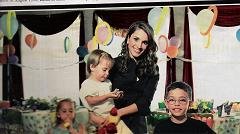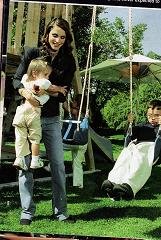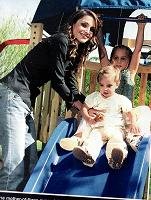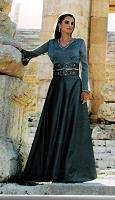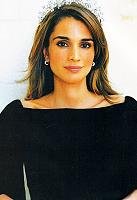Speech at the World Economic Forum 2003
January 27, 2003, Davos, Switzerland
Thank you, Professor Schwab [Klaus Schwab, president of the World Economic Forum]. And thank you all for your warm welcome. It is an honour to be here.
This session is called a dialogue, and I hope and believe it will be a dialogue — a chance to begin a real conversation.
You know, when I open my e-mail, sometimes I'll get an alert window that says, “the message sender has requested a response.” Well, to the extent that I have a message today, this message sender hopes that all of you will respond. And not only here and now, with me. But in the days and months ahead, with the people of my region — Jordanians and Arabs, many of them young and optimistic. They are looking for a new, two-way dialogue with the people of the world.
It goes without saying that ours is a critical time. Not simply in terms of global security, or politics, or economics. It is a critical time in terms of ideas; the basic ideas on which this century builds its promise — ideas like: Peace with justice; equal opportunity; and tolerance for others.
These values are goals, certainly — ideals to aim for, in the best of worlds. But let me suggest that today, peace, opportunity, and tolerance are more than goals. They are also resources — essential elements of our increasingly global system. They drive 21st century success no less than energy or technology. In that sense, peace and opportunity and tolerance are not a luxury, not the final icing on the cake — they are the very bread of life, the fuel that is needed, right now, for a safe, free, and prosperous world.
So, we need to ask ourselves — as a global community, have we invested sufficiently in these resources? And most of all, what are we doing to build trust in our values, to make them something on which all people can rely?
To me, these questions are made very urgent by the “hope gap” that I have seen around the globe — the dangerous gulf, between those people who really feel part of this new century, and the many, far too many, who feel left behind.
I have also been struck by the Forum's interesting new survey on global trust. As we've learned, the survey finds that trust in key institutions has fallen to critical levels all over the world.
The survey speaks of trust in institutions. Yet what may be most at risk is trust in the values those organisations are supposed to represent.
Think about a boy in the West Bank who powers on a computer and looks through a virtual window onto a world of peace and prosperity. Then he looks out his own window at barricades and violence and closed streets. And this goes on year after year. What's at risk for that child and other children, on both sides of this conflict, is trust that peace can ever be real. That is an attitude they will carry into adult life, if we don't make a difference now.
Or think about a young girl in Afghanistan who can finally go to school after years of exclusion. Then the school door slams shut — because there are no funds for books or teachers or technology. What's at risk for this child, and many others, is real hope in the opportunity to share in this century. Again, that's an outlook that can shape their lives for years to come.
“Hope gaps” like these are found in various ways, in too many places around the world. Is there any doubt that these are the populations most vulnerable to those who teach despair, hatred and violence?
People who are trapped by failed hopes can easily become disillusioned and cynical about values like peace and tolerance. And cynicism is contagious; it can also affect those looking from the outside in and diminish their will to make ours a better world. Yet humanity's greatest message may be that contrary to the cynics, trust in core values does pay off.
This is something that we in Jordan really understand. We are a small country — resource-poor — hemmed in by some of the world's most bitter conflicts. Development, education, health, economic growth — all these are huge challenges. In today's climate, with the Palestinian-Israeli conflict raging to our west, and a potential war looming to our east, it might seem easy to write us off. Indeed, it might seem easy for Jordanians to be cynical about their prospects, to shift to low gear, to lay low, to put off our crucial reform plans until the political storms around us subside.
Instead, under the leadership of His Majesty King Abdullah, we have pushed forward an accelerated model of achievement and excellence. We have decided to strengthen our trust in age-old values of hard work, peace, and equal opportunity. More importantly, we have decided not to throw in the towel come what may.
This is the genius of Jordan, and it is beginning to pay off. We see that in economic growth — over 5 per cent in 2002; we see that in all our leading indicators such as productivity, cash reserves, and exports. But we also see it in terms of attitude and confidence. Allow me to quote a recent newsletter published by a leading investment bank in Jordan — “investors at the Amman Stock Exchange (ASE) still seem unfazed by political news, which hampered their activity in 2002, and are now trading quite enthusiastically.”
Ours is a leadership that devotes all its energy to make hope real, and in my journeys around the world, I have seen that same spirit in many places. Especially here at Davos, I meet winners in every sphere, who have the gift of making their ideas and values come to life. I believe that we now have a challenge, and an opportunity, to help millions around the world make their hopes real.
One important challenge is to bring our values to bear on one of the worst “hope gaps” in the world: The gap between regions that have enjoyed the benefits of peace, and those that are paying the terrible price of ongoing violence and conflict. If we are going to fuel new realities, we need to find a way to flow hope across this divide.
Today, just as a pipeline connects areas rich in resources like oil or water, with areas that lack these essential resources, a “peaceline” is needed to bring the benefits of peace to regions in conflict. That means, for example, flowing more investment — or perhaps I should say, more creative investment — into war-tired communities. New, public-private partnerships can be a seedbed to grow civil society. A global commitment to opening the school doors can open minds as well. And innovative outreach, like microfinance, can bring solutions to the street. In Kosovo, I visited communities being rebuilt by war survivors, many of them women, using loans as small as $100. This work has the power to transform lives.
Perhaps most of all, a “peaceline” means streaming a new dialogue of tolerance and mutual respect, one that understands we all have a stake in the global system. The West-Islamic World Dialogue that has begun at this Forum is a major contribution. I thank Professor Schwab for his sincere efforts in making this important dialogue a reality.
The idea of a “peaceline” is just one way to think about the deep connections among us. Truly, global peace isn't something that we will get by turning on a tap. We will have to work for it, drill deep, and keep the ideas and hope flowing. The well of human creativity and capability is never empty. The resources of peace, of opportunity, of tolerance, are there.
I learned that best from the life of my father-in-law, His Late Majesty, King Hussein. He reigned for 47 years and had basically seen it all — the rise and fall of nations, the dramatic shift in alliances, the demise of great leaders. He worked for peace for several decades. Every ounce of success was weighed down by tonnes of disappointments. He had every right to be cynical about the prospects of peace. Indeed, he would have been forgiven if he had relabelled cynicism and called it realism. But he chose not to.
In the last months of his life, the Arab-Israeli peace process had again stalled in violence. At that time, King Hussein was being treated for advanced cancer. Instinctively, he left the cancer unit, and went back to work for peace at the Wye River Conference. He attended, if you recall, the White House ceremony announcing an agreement. He looked frail from his battle with cancer, but his eyes foretold a story of a moral passion that will live on long after his death.
And, indeed, ours is a better world because people can still trust his values. King Hussein taught me, and millions of others, that in the pursuit of basic values, such as peace and freedom, we can never fail. We just have to keep the hope alive, continue the dialogue, and top it all up with plenty of hard work.
Thank you very much.



